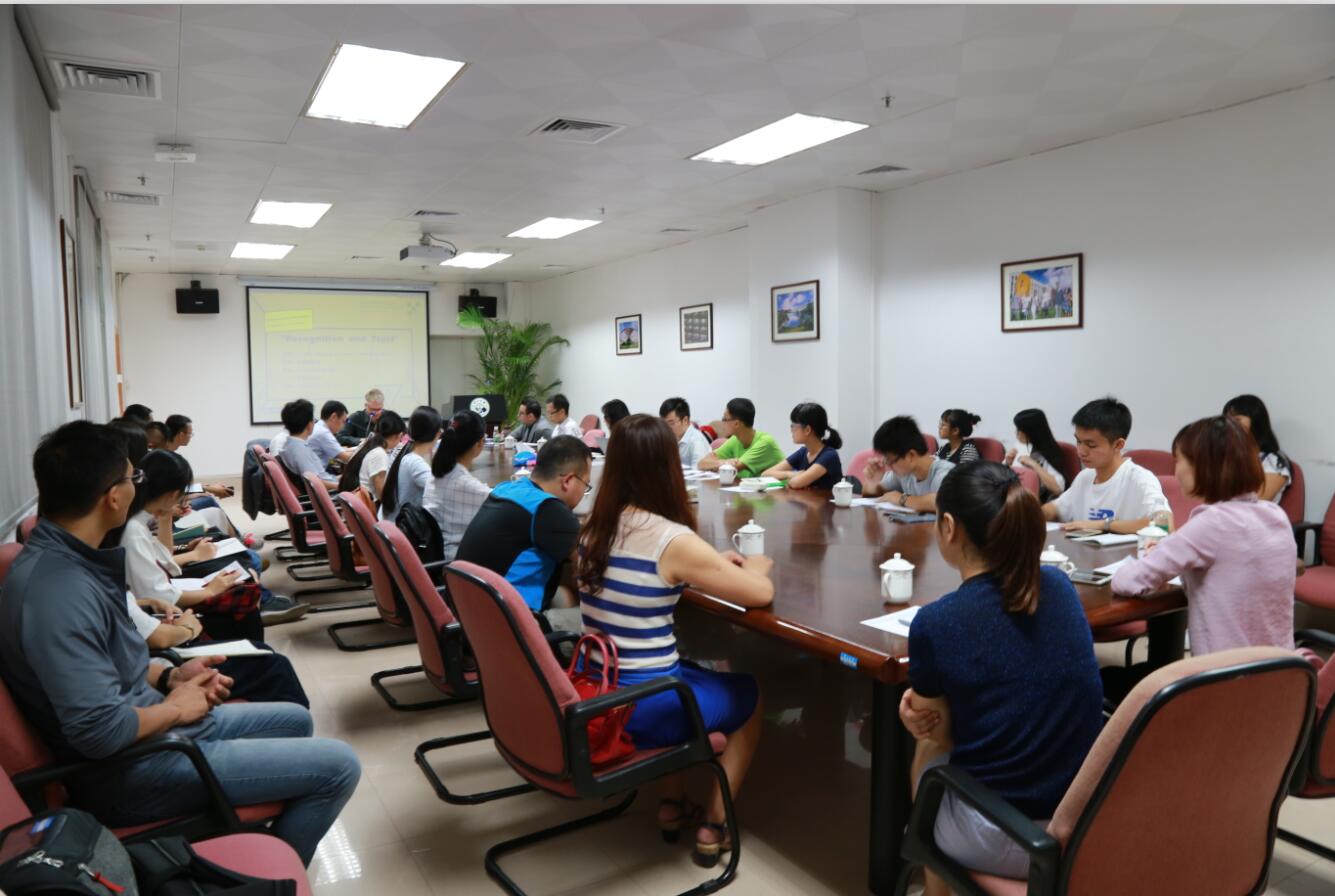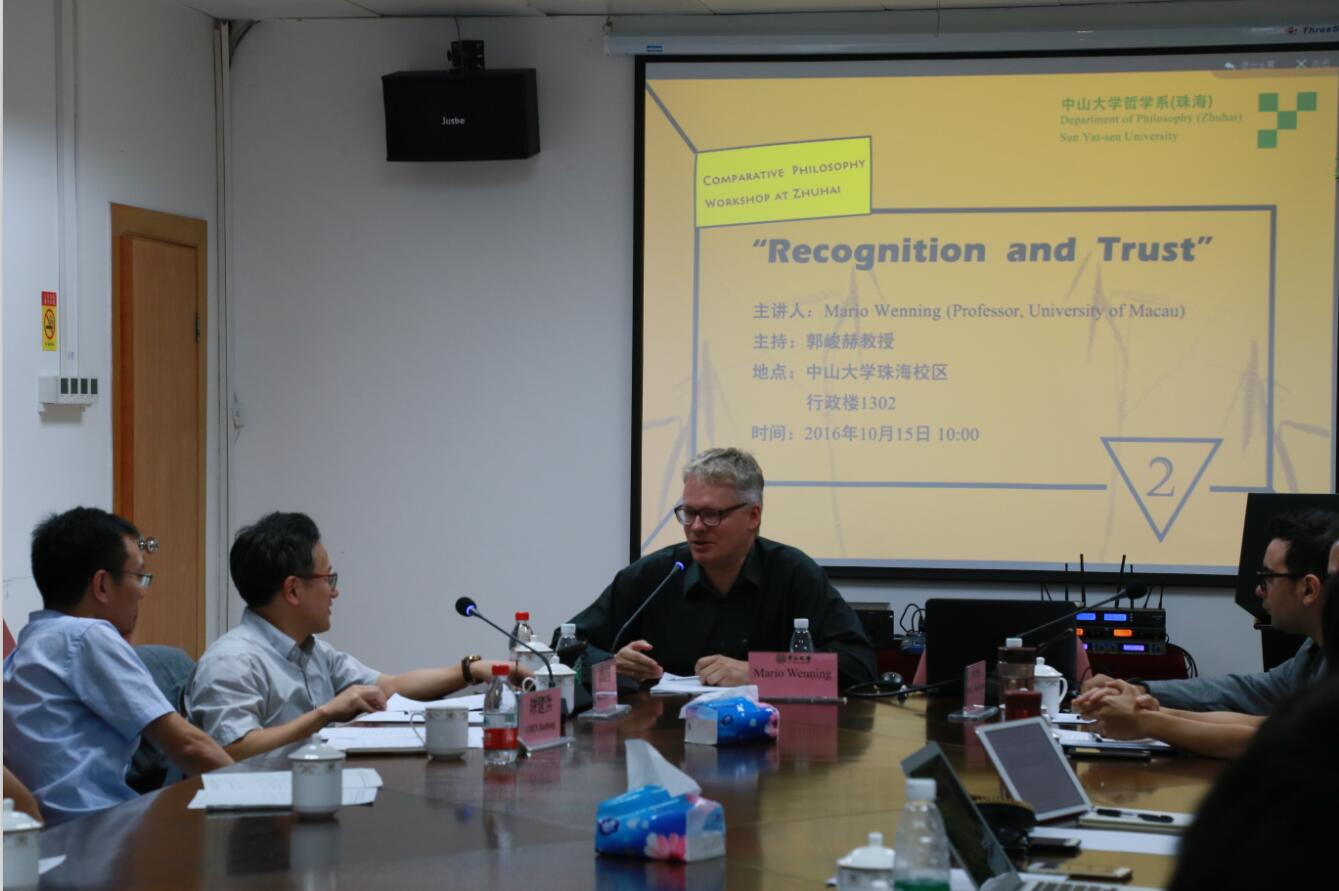Comparative Philosophy Workshop系列第二讲: Recognition and Trust
2016年10月15日上午10:00,哲学系(珠海)Comparative Philosophy Workshop系列第二讲在中山大学珠海校区行政楼第一会议室顺利举行。
本次研讨会由我系郭峻赫教授(Jun-Hyeok Kwak)主持,来自澳门大学的Mario Wenning教授展开了主题为Recognition and Trust的讲演。
Prof.Wenning 比较分析了黑格尔和孔子的“信任”概念。他认为,黑格尔的信任感取决于其认知理论和认知斗争,并提出黑格尔的理论并不完善。因而,Prof.Wenning 转向中国儒家思想中的“信”和“礼”的观念来寻求解决黑格尔的理论中的问题,认为儒家思想对于批评性的社会和政治理论都是相当突出的。
Prof.Wenning 报告结束之后,我系研究员Dr.Rodrigues对其文章及报告提出本人的见解和疑惑。研讨会出席的学者与 Prof.Wenning 展开讨论,现场碰撞出不少的火花,与会的学生也参与提问,Prof.Wenning 一一进行了详细的解答。
会议最后,郭峻赫教授对本次研讨会做了总结。中山大学哲学系(珠海)Comparative Philosophy Workshop系列第二讲圆满结束。

Comparative Philosophy Workshop Report: Recognition and Trust
The Department of Philosophy( Zhuhai), Sun Yat-sen University held the second round of the Comparative Philosophy Workshop. The presenter was Professor Mario Wenning from the University of Macau. Professor Wenning’s paper offered two main arguments.
The first is that recognition, as conceived by Hegel and at least some Hegelians, has some limitations. The second thesis advanced is that a Confucian account of trust may be able to address the problems raised regarding Hegelian recognition.
After Professor Wenning presenting his arguments, Professor Kwak, as a moderator made some initial comments regarding the paper and passed the word to Dr. Rodrigues, who was the respondent. Dr. Rodrigues pointed out that the Confucianism may not solve the problems raised against recognition and that there may be some possible ways to rescue recognition from the limitations pointed out by Professor Wenning.
After the comments from Dr. Rodrigues, the audience also posed some questions to Professor Wenning’s paper. The audience was extremely responsive to Professor Wenning’s presentation.
Professor Chen commented that the implicit feminist interpretation of Professor Wenning may not be faithful to the Confucian text. Moreover, Professor Chen suggested that the solution offered in the presentation not only may neither please Hegelians or Confucians but also that it may have some limitations regarding its applicability the Chinese context. Professor Kwak enquired the speaker regarding methodological issues in his paper and also asked if the concept of ‘trust’ could be further clarified. Additionally, Professor Kwak asked if there could be a connection with concepts from other philosophers, such as Heidegger. Dr. Pao-Shen Ho argued that there may be a need to put into context the statements of Hegel and Confucius regarding trust. Finally, Dr. Luo raised some concerns regarding methodology.
On top of this various undergraduate and postgraduate students were also extremely interested in the paper presented and asked some questions.
We thank Professor Wenning for offering such a thought-provoking and stimulating a presentation and all the audiences for their participation.
(Reported by Dr. Luis Rodrigues)



